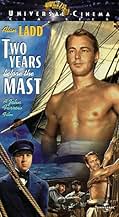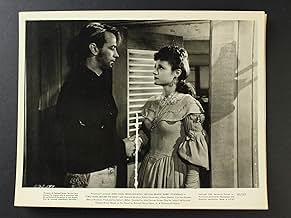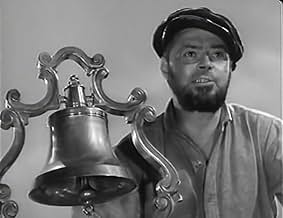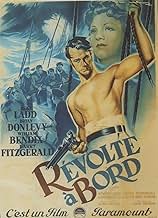IMDb RATING
6.9/10
589
YOUR RATING
The playboy son of a wealthy shipping magnate discovers at first hand the desperate privations suffered by the crew of one of his father's ships after he is unwillingly press-ganged aboard.The playboy son of a wealthy shipping magnate discovers at first hand the desperate privations suffered by the crew of one of his father's ships after he is unwillingly press-ganged aboard.The playboy son of a wealthy shipping magnate discovers at first hand the desperate privations suffered by the crew of one of his father's ships after he is unwillingly press-ganged aboard.
- Director
- Writers
- Stars
- Awards
- 3 wins total
- Director
- Writers
- All cast & crew
- Production, box office & more at IMDbPro
Featured reviews
When the story begins, a merchant ship has just arrived in Boston and the Captain of this ship has a reputation as a real jerk. That same night, the ship owner's son, Charles (Alan Ladd), is knocked out by a press gang and later awakens on this same ship...forced to become a crewmember on this ship of the damned.
Through the journey, the Captain (Howard De Silva), is a real monster--treating his crew with little respect nor dignity. Over time, the crew begin to die off from scurvy...and yet the captain does nothing to remedy the situation. His only desire is to complete his round the world journey as fast as possible. Eventually it gets so bad that mutiny seems to be the only alternative. What's next?
This film surprised me. At first, I thought it was going to just be another Alan Ladd featured adventure flick...the sort of thing Paramount churned out again and again once he became a star. Instead, I was taken aback by two things. It really was NOT an Alan Ladd film but much more a film with an ensemble cast. It did not rest solely on Ladd's shoulders and the film allowed for several really good performances. De Silva was at his evil best but kudos also to William Bendix, Brian Donlevy, Albert Dekker and young Daryl Hickman. In addition, the film had real depth to it....and was very exciting. It was not just another programmer. Overall, a surprisingly good and exciting adventure film...one I really enjoyed.
Through the journey, the Captain (Howard De Silva), is a real monster--treating his crew with little respect nor dignity. Over time, the crew begin to die off from scurvy...and yet the captain does nothing to remedy the situation. His only desire is to complete his round the world journey as fast as possible. Eventually it gets so bad that mutiny seems to be the only alternative. What's next?
This film surprised me. At first, I thought it was going to just be another Alan Ladd featured adventure flick...the sort of thing Paramount churned out again and again once he became a star. Instead, I was taken aback by two things. It really was NOT an Alan Ladd film but much more a film with an ensemble cast. It did not rest solely on Ladd's shoulders and the film allowed for several really good performances. De Silva was at his evil best but kudos also to William Bendix, Brian Donlevy, Albert Dekker and young Daryl Hickman. In addition, the film had real depth to it....and was very exciting. It was not just another programmer. Overall, a surprisingly good and exciting adventure film...one I really enjoyed.
It's been years since I read the book but as I remember it there was no Allan Ladd figure in it, a ne'er do well who is shanghaied aboard the cargo ship Pilgrim. There was just Richard Henry Dana who had dropped out of Harvard because of faulty vision and signed aboard because he thought it might help clear his sight. He didn't go back to college but he left an enduring and compelling account of his trip in the 1840s from Boston to the California coast, and his return aboard the Alert.
The record wasn't only accurate. It was colorful and even lyrical. Herman Melville acknowledged it as an inspiration for Moby Dick. It's an amazingly evocative narrative. Dana Point in southern California is named after him. He and his mates stood atop the cliffs and flung cow hides down to the sailors below, to be loaded aboard the ship.
California at the time was a province of Mexico, and places like San Francisco ("Yerba Buena") and Los Angeles were villages surrounded by large Spanish land grants and ranches. Dana was a humanitarian and, coming from New England, an anti-slavery activist. His purpose was to leave an accurate record of the life of sailors aboard American ships, documenting their characters and their mistreatment.
That's about what I remember from the book. The 1946 movie with Allan Ladd seems to owe a good deal to Jack London's "Sea Wolf", the story of a wealthy young shipwreck survivor picked up by a ship and coerced into working as a members of the crew by a captain who was a madman. This skipper, Howard Da Silva, isn't nuts but insists the men carry out his wishes as if they were the word of God. Maybe Captain Bligh was the inspiration here.
Life on the Pilgram is a rough life. Ladd is assigned the most menial of duties on the deck force while a very young stowaway is appointed cook's helper. In terms of working hours, cooks have one of the roughest jobs of all. They don't strain their muscles, as we had to on the deck force of a Coast Guard cutter, USCGC Gresham, but they have to get up before any of the rest of the crew and start preparing breakfast. And they don't stop working until they've finished cleaning up after the last meal of the day, hours after the day workers have stopped.
The deck force is no picnic either. Everyone on my ship knew the story (possibly "fake news") of the boatswain's mate on a neighboring ship who slapped a seaman across the face and gave him a bloody nose, then made him get on his knees and holystone the blood off the wooden deck. The Chief BM on the Gresham went no farther than raising fist over me and threatening to belt me. Oh, it was rough duty. The blond young Swedish maids helped ease the pain.
Where was I? Yes, no sea duty today compares to what these guys go through -- twenty lashes for looking cross-eye at an officer, and so forth. What's always puzzled me is, if they're going to administer lashes, why do they always rip the shirt down his back? Why not ask him to take it off? Brian Donlevy plays Richard Henry Dana, writing the book in his spare time.
The book, as I say, was a literary gem. Dana captured the experience of working on a sailing ship, including the floggings and the scurvy. (Viz: "Limeys.") Beyond that he gave us treats on landfalls, storms, and ice bergs. Da Silva is the uncompromising and humorless captain. William Bendix is the brutal First Mate Amazeen who gets to belt Ladd on the face. If the producers needed someone to beat hell out of Ladd, more than once it was Bendix. The two men were friends, despite a temporary falling out over Ladd's lack of interest in enlisting during the war.
In Pernambuco, the Pilgrim acquires a passenger -- a beautiful young woman, what else? Compare this to The Sea Wolf, which also picks up a pretty young girl and Jack London's prose turns to mush. Actually, here, Esther Fernández as the requisite romantic role, is quite attractive and gives a respectable performance. Her career flourished in her native Mexico.
I don't think I'll give away the ending except to say there is a violent clash, some deaths, and a victory of sorts. You'll probably enjoy the move. It's aglow with resentment and tension.
The record wasn't only accurate. It was colorful and even lyrical. Herman Melville acknowledged it as an inspiration for Moby Dick. It's an amazingly evocative narrative. Dana Point in southern California is named after him. He and his mates stood atop the cliffs and flung cow hides down to the sailors below, to be loaded aboard the ship.
California at the time was a province of Mexico, and places like San Francisco ("Yerba Buena") and Los Angeles were villages surrounded by large Spanish land grants and ranches. Dana was a humanitarian and, coming from New England, an anti-slavery activist. His purpose was to leave an accurate record of the life of sailors aboard American ships, documenting their characters and their mistreatment.
That's about what I remember from the book. The 1946 movie with Allan Ladd seems to owe a good deal to Jack London's "Sea Wolf", the story of a wealthy young shipwreck survivor picked up by a ship and coerced into working as a members of the crew by a captain who was a madman. This skipper, Howard Da Silva, isn't nuts but insists the men carry out his wishes as if they were the word of God. Maybe Captain Bligh was the inspiration here.
Life on the Pilgram is a rough life. Ladd is assigned the most menial of duties on the deck force while a very young stowaway is appointed cook's helper. In terms of working hours, cooks have one of the roughest jobs of all. They don't strain their muscles, as we had to on the deck force of a Coast Guard cutter, USCGC Gresham, but they have to get up before any of the rest of the crew and start preparing breakfast. And they don't stop working until they've finished cleaning up after the last meal of the day, hours after the day workers have stopped.
The deck force is no picnic either. Everyone on my ship knew the story (possibly "fake news") of the boatswain's mate on a neighboring ship who slapped a seaman across the face and gave him a bloody nose, then made him get on his knees and holystone the blood off the wooden deck. The Chief BM on the Gresham went no farther than raising fist over me and threatening to belt me. Oh, it was rough duty. The blond young Swedish maids helped ease the pain.
Where was I? Yes, no sea duty today compares to what these guys go through -- twenty lashes for looking cross-eye at an officer, and so forth. What's always puzzled me is, if they're going to administer lashes, why do they always rip the shirt down his back? Why not ask him to take it off? Brian Donlevy plays Richard Henry Dana, writing the book in his spare time.
The book, as I say, was a literary gem. Dana captured the experience of working on a sailing ship, including the floggings and the scurvy. (Viz: "Limeys.") Beyond that he gave us treats on landfalls, storms, and ice bergs. Da Silva is the uncompromising and humorless captain. William Bendix is the brutal First Mate Amazeen who gets to belt Ladd on the face. If the producers needed someone to beat hell out of Ladd, more than once it was Bendix. The two men were friends, despite a temporary falling out over Ladd's lack of interest in enlisting during the war.
In Pernambuco, the Pilgrim acquires a passenger -- a beautiful young woman, what else? Compare this to The Sea Wolf, which also picks up a pretty young girl and Jack London's prose turns to mush. Actually, here, Esther Fernández as the requisite romantic role, is quite attractive and gives a respectable performance. Her career flourished in her native Mexico.
I don't think I'll give away the ending except to say there is a violent clash, some deaths, and a victory of sorts. You'll probably enjoy the move. It's aglow with resentment and tension.
In the 1830's, the foppish son of a ship owner is shanghaied aboard his father's ship where he experiences the harsh realities of a brutal captain.
Leonard Maltin gives the movie a 1 & ½ out of 4. Shame on him. Sure, the film is no Mutiny on the Bounty (1935), and the script could be sharper. But, it's still a riveting shipboard drama, thanks to a fine cast, a good story, and a strong moral lesson. In the movie's pivotal role, Ladd transitions from a spoiled fop to a man among men in convincing fashion. The actor was never one to emote; at the same time, his low-key manner blends in well with the macho crew. And a heckuva crew it is—such forceful types as Dekker, Bendix, Donlevy, and, of course, a fearsome Howard DaSilva as the brutal captain. Mix and stir and you've got the ingredients of a highly combustible drama.
Of course, old Hollywood always created its own version of history. It's no secret the studios habitually bent fact in return for commercial appeal. So its not surprising that Paramount took liberties with the Dana book. For example, the script works a woman (Fernandez) onto the ship, which is not in the book. I expect they did that to burnish Ladd's appeal as a leading man and to widen audience appeal to include women-- never mind the facts of the book. As some anonymous wag put it-- never let the facts stand in the way of a good story.
Fortunately, it is a good story, even if the ship never leaves the sound stage. However, I wish director Farrow had made better use of close-ups to underscore dramatic high points. He's too impassive in what amounts to a very involving story. That aside, the movie certainly rates far better than a 1 & ½.
Leonard Maltin gives the movie a 1 & ½ out of 4. Shame on him. Sure, the film is no Mutiny on the Bounty (1935), and the script could be sharper. But, it's still a riveting shipboard drama, thanks to a fine cast, a good story, and a strong moral lesson. In the movie's pivotal role, Ladd transitions from a spoiled fop to a man among men in convincing fashion. The actor was never one to emote; at the same time, his low-key manner blends in well with the macho crew. And a heckuva crew it is—such forceful types as Dekker, Bendix, Donlevy, and, of course, a fearsome Howard DaSilva as the brutal captain. Mix and stir and you've got the ingredients of a highly combustible drama.
Of course, old Hollywood always created its own version of history. It's no secret the studios habitually bent fact in return for commercial appeal. So its not surprising that Paramount took liberties with the Dana book. For example, the script works a woman (Fernandez) onto the ship, which is not in the book. I expect they did that to burnish Ladd's appeal as a leading man and to widen audience appeal to include women-- never mind the facts of the book. As some anonymous wag put it-- never let the facts stand in the way of a good story.
Fortunately, it is a good story, even if the ship never leaves the sound stage. However, I wish director Farrow had made better use of close-ups to underscore dramatic high points. He's too impassive in what amounts to a very involving story. That aside, the movie certainly rates far better than a 1 & ½.
This is a movie to see to get a feel for what it must have been like back in the "good old days" of tall ships and iron men. Lemme tell ya, the cruise ships of today are as far from "sailing" as a toy poodle is from a wolf.
This is one of my favorite movies, Alan Ladd is wonderful as the spoiled rich boy, while Howard Da Silva as the ruthless captain only interested in setting a new record around Cape Horn creates a new high-water mark for callousness. (What's with sea captains in Hollywood movies, anyway? If it's not the bumbling incompetence of Bogart's Queeg it's the cold heartlessness of Trevor Howard and Charles Laughton's Captain Bligh.) The stowaway kid (Darryl Hickman) is a bit over-the-top I admit, but it seems they all were in movies made back then. Speaking of back then, this baby is in black-and-white, and although some of the scenes in the various waterfront bars and in the hold of the ship benefit thereby, the outdoor scenes suffer a bit because of it. And speaking of outdoor scenes, they really didn't put much of the budget into special effects, as the boat looks exactly like what it is, a toy bobbing around in someone's bathtub.
Still, that's not why people love this movie. It's the fascination of watching Alan Ladd's Charles Stewart transformed from rich, obnoxious playboy into deeply affected human being as he watches the massive cruelty and abuse around him. The cruelty and virtual slavery of these sailors is portrayed with an unflinching eye, and you're cheering along with them when the final confrontation unfolds. As someone wiser than me observed, "Going to sea is going to jail, with a chance at drowning besides."
This is one of my favorite movies, Alan Ladd is wonderful as the spoiled rich boy, while Howard Da Silva as the ruthless captain only interested in setting a new record around Cape Horn creates a new high-water mark for callousness. (What's with sea captains in Hollywood movies, anyway? If it's not the bumbling incompetence of Bogart's Queeg it's the cold heartlessness of Trevor Howard and Charles Laughton's Captain Bligh.) The stowaway kid (Darryl Hickman) is a bit over-the-top I admit, but it seems they all were in movies made back then. Speaking of back then, this baby is in black-and-white, and although some of the scenes in the various waterfront bars and in the hold of the ship benefit thereby, the outdoor scenes suffer a bit because of it. And speaking of outdoor scenes, they really didn't put much of the budget into special effects, as the boat looks exactly like what it is, a toy bobbing around in someone's bathtub.
Still, that's not why people love this movie. It's the fascination of watching Alan Ladd's Charles Stewart transformed from rich, obnoxious playboy into deeply affected human being as he watches the massive cruelty and abuse around him. The cruelty and virtual slavery of these sailors is portrayed with an unflinching eye, and you're cheering along with them when the final confrontation unfolds. As someone wiser than me observed, "Going to sea is going to jail, with a chance at drowning besides."
I am disappointed to see the sparsity of votes for this very-of-guys movie. This box-office smash of 1946 which is a sly attempt to invoke the more academy award favored Mutiny on the Bounty. Obviously, this movie was made to win awards and to give prestige to the studio, producer and actors involved. It did not garner a single nomination. Based on a true story and a best-selling non-fiction book from the 19th Century, it details the kind of cruelty and inhumanity that was used back then to run a ship. The stand-out of many fine performances is Howard da Silva as the captain Thompson who is more interested in breaking arrival records than in keeping the health, morality or moue of his crew in a flush of pink. Alan Ladd is the somewhat lead for make no mistake, this is no Ladd piece but an ensemble of Paramount's finest and great character actors. William Bendix, an actor who puts to shame the theory that real acting began with those "method" actors of the fifties with everything he does, is perfect as the first mate Amanzine. Shot strictly on studio sets, it does have the necessary realism of the open seas and azure skies that could give it the needed extra texture but it tries and works all the same. Unexpected events happen and formula is avoided until a rushed third act and ending that feels to hurried to resonate. That is why I voted it an 8/10. It is just too flat, as if the producers were late for dinner or something and slapped something together. Surely, events you want to see resolved is giving the sleight of hand and the picture is only 98 mins, so why the hurry? A good guy's movie with fine performances. It could have been a classic but it's just a good movie. P.S. I cannot believe Da Silva was not nominated for his performance. That is just a plain travesty.
Did you know
- TriviaAccording to Howard Da Silva in Alan Ladd's biography, Ladd and William Bendix did not talk to each other although they were friends. Between the scenes everyone went their separate ways.
- Quotes
Captain Francis A. Thompson: Mr. Foster, remove his shirt.
2nd Mate Foster: Aye, aye, sir.
Charles Stewart: Never mind. I'll take it off.
- ConnectionsReferenced in King Leonardo and His Short Subjects: Anchors Awry or Nautical Nut (1961)
- SoundtracksTake Back the Heart
Written by Claribel (Charlotte Arlington Barnard) and Mrs. G.R. Gifford
- How long is Two Years Before the Mast?Powered by Alexa
Details
- Release date
- Country of origin
- Languages
- Also known as
- Two Years Before the Mast
- Filming locations
- Production company
- See more company credits at IMDbPro
Box office
- Budget
- $2,000,000 (estimated)
- Runtime
- 1h 38m(98 min)
- Color
- Aspect ratio
- 1.37 : 1
Contribute to this page
Suggest an edit or add missing content





































